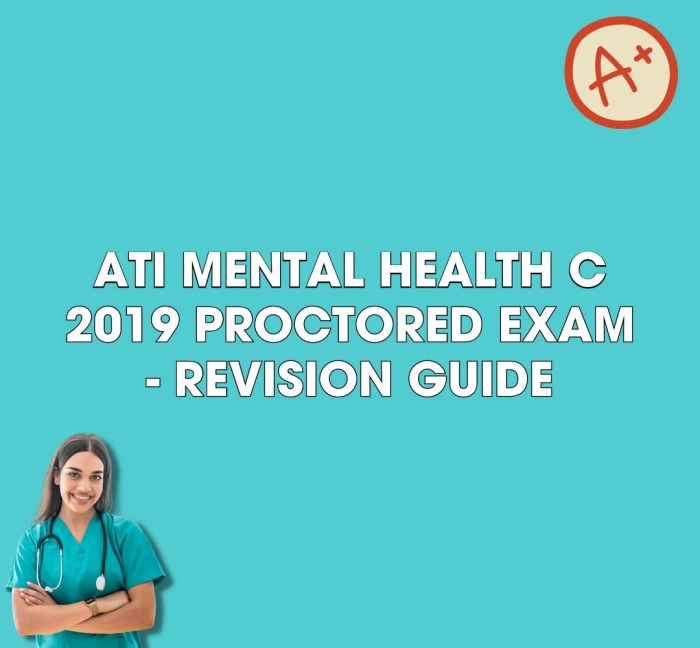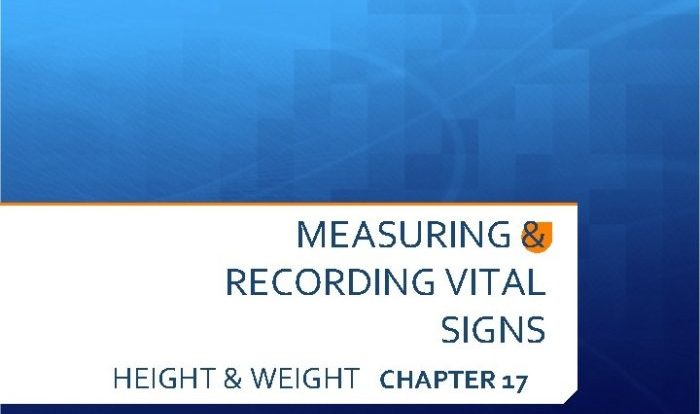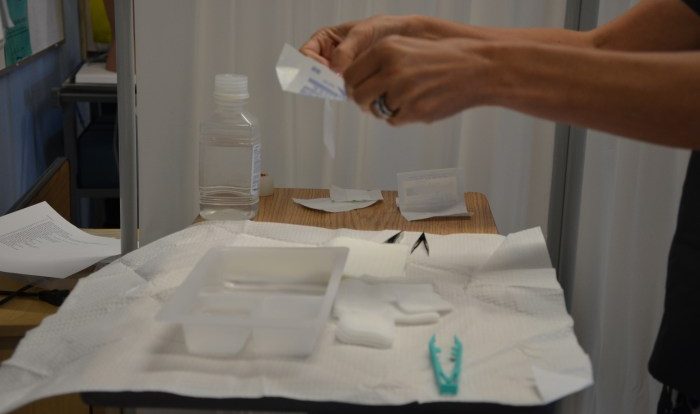The ATI Mental Health 2019 Proctored Exam is a crucial assessment for nurses seeking to demonstrate their proficiency in mental health nursing. This comprehensive guide delves into every aspect of the exam, empowering you with the knowledge and strategies to excel.
This guide covers the exam’s purpose, structure, and content, providing a clear understanding of what to expect. It also offers expert advice on study resources, preparation techniques, and test-taking strategies, ensuring your success on exam day.
ATI Mental Health 2019 Proctored Exam Overview
The ATI Mental Health 2019 Proctored Exam is a comprehensive assessment designed to evaluate the knowledge and skills of individuals seeking certification in mental health nursing. It covers a wide range of topics essential for providing safe and effective care to individuals with mental health conditions.
The exam consists of 150 multiple-choice questions and is administered in a proctored environment. Candidates have three hours to complete the exam, and a passing score of 70% is required to achieve certification.
Eligibility Criteria, Ati mental health 2019 proctored exam
To be eligible for the ATI Mental Health 2019 Proctored Exam, candidates must:
- Be a registered nurse (RN) with a current license.
- Have a minimum of one year of experience in mental health nursing.
- Complete an ATI Mental Health Review Course or have equivalent knowledge and skills.
Registration Process
Candidates can register for the ATI Mental Health 2019 Proctored Exam online through the ATI website. The registration fee is $250, and the exam can be scheduled at a testing center convenient for the candidate.
Exam Content and Blueprint
The ATI Mental Health 2019 Proctored Exam covers a comprehensive range of content related to mental health nursing. The exam blueprint Artikels the major content areas and their respective percentage breakdown:
Content Areas and Percentage Breakdown
- Assessment and Diagnosis (30%)
- Psychopharmacology (20%)
- Therapeutic Interventions (25%)
- Ethical and Legal Considerations (15%)
- Professional Roles and Responsibilities (10%)
Assessment and Diagnosis
This content area focuses on the principles and techniques of psychiatric assessment, including:
- Interviewing skills
- Mental status examination
- Differential diagnosis
- DSM-5 criteria
Psychopharmacology
This content area covers the pharmacological management of mental health conditions, including:
- Classes of psychotropic medications
- Medication effects and side effects
- Medication administration and monitoring
- Pharmacokinetics and pharmacodynamics
Therapeutic Interventions
This content area emphasizes the various therapeutic approaches used in mental health nursing, including:
- Psychotherapy (e.g., CBT, DBT)
- Group therapy
- Milieu therapy
- Crisis intervention
Ethical and Legal Considerations
This content area addresses the ethical and legal principles that guide mental health nursing practice, including:
- Patient confidentiality
- Informed consent
- Cultural competence
- Legal responsibilities of nurses
Professional Roles and Responsibilities
This content area Artikels the roles and responsibilities of mental health nurses, including:
- Patient advocacy
- Interdisciplinary collaboration
- Professional development
- Quality improvement
Study Resources and Preparation Strategies
To achieve success on the ATI Mental Health 2019 Proctored Exam, a comprehensive preparation plan is essential. This involves utilizing effective study materials and implementing strategic study methods.
Recommended Study Materials
The following resources are highly recommended for exam preparation:
- ATI Mental Health 2019 Proctored Exam Study Guide
- ATI Mental Health 2019 Proctored Exam Practice Questions
- ATI Mental Health 2019 Proctored Exam Flashcards
- Mental Health Nursing textbooks and study guides
- Peer-reviewed journal articles on mental health topics
Effective Study Methods and Time Management Techniques
To maximize study efficiency, it is crucial to adopt effective study methods. These include:
- Active Recall:Regularly test yourself on the material by actively trying to recall information from memory.
- Spaced Repetition:Review the material at increasing intervals to strengthen memory retention.
- Chunking:Break down large amounts of information into smaller, manageable chunks for easier comprehension.
- Pomodoro Technique:Alternate focused study sessions with short breaks to enhance concentration and prevent burnout.
- Prioritization:Focus on understanding key concepts and prioritize areas where you need improvement.
Approaching Different Question Types
The ATI Mental Health 2019 Proctored Exam includes various question types. To approach each type effectively:
- Multiple Choice:Carefully read the question and all answer options. Eliminate incorrect choices based on logic and knowledge.
- True/False:Determine the accuracy of the statement and be aware of potential trick questions.
- Fill-in-the-Blank:Recall specific facts or terms and fill in the missing information accurately.
- Case Studies:Analyze the case and apply your knowledge to identify symptoms, diagnoses, and appropriate interventions.
- Priority Questions:Identify the most urgent and appropriate action based on the patient’s condition.
Exam Day Logistics and Test-Taking Strategies
Preparation is crucial for the ATI Mental Health 2019 Proctored Exam, but it’s equally important to be aware of the exam day procedures and strategies to maximize your performance.
On the day of the exam, arrive at the testing center well-rested and on time. Bring your photo ID, exam confirmation, and any necessary materials such as a calculator and pencils. You will be required to sign in and provide your identification.
The proctor will then provide instructions and ensure you understand the exam format and rules.
Time Management
The ATI Mental Health 2019 Proctored Exam is a timed exam. Effective time management is essential to complete the exam within the allotted time. Prioritize answering questions you are confident about first. If you encounter a challenging question, mark it for review and return to it later.
Stress and Anxiety Management
It’s natural to experience some stress and anxiety on exam day. Practice relaxation techniques such as deep breathing or meditation before the exam. During the exam, focus on staying calm and present. Remember that everyone experiences some level of anxiety, and it’s okay to take a moment to compose yourself if needed.
Post-Exam Analysis and Results Interpretation

After completing the ATI Mental Health 2019 Proctored Exam, it is crucial to analyze your results thoroughly to identify areas for improvement and gauge your readiness for nursing practice.
To access your exam results, log in to the ATI website and navigate to the “My Results” section. You will find a detailed report outlining your performance on each section of the exam, including your overall score and percentile rank.
Interpreting Exam Results
Interpreting your exam results involves understanding the following key metrics:
- Overall Score:Indicates your overall performance on the exam.
- Percentile Rank:Compares your score to other students who have taken the exam, indicating your relative standing.
- Section Scores:Provide insights into your strengths and weaknesses in specific content areas.
Exam performance can be categorized as follows:
- Excellent (90th percentile or higher):Demonstrates a strong understanding of the subject matter.
- Good (75th-89th percentile):Indicates a solid grasp of the concepts but may benefit from additional review.
- Fair (50th-74th percentile):Suggests areas for improvement and the need for focused study.
- Poor (Below 50th percentile):Highlights significant weaknesses and the need for substantial remediation.
FAQ Guide
What is the purpose of the ATI Mental Health 2019 Proctored Exam?
The exam assesses nurses’ knowledge and skills in mental health nursing, ensuring their competence in providing safe and effective care to patients with mental health conditions.
What is the format of the exam?
The exam consists of 150 multiple-choice questions, covering a wide range of mental health topics.
How long is the exam?
Candidates have 3 hours and 30 minutes to complete the exam.
How is the exam scored?
The exam is scored on a scale of 0-100, with a passing score of 70.

